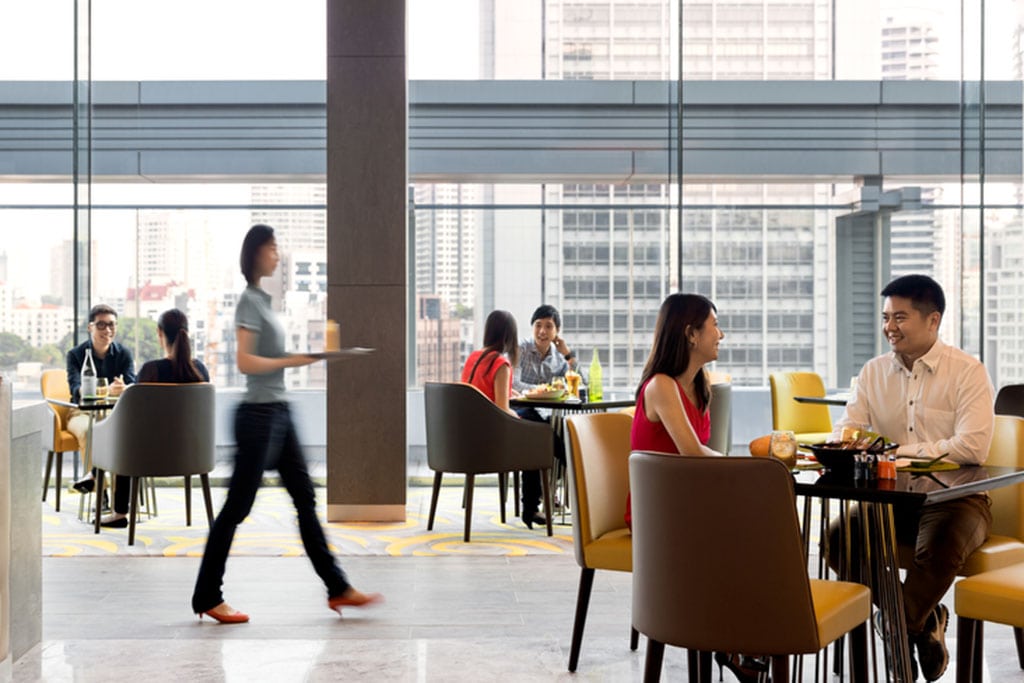Skift Take
While this is nothing especially new in the Western hemisphere, it's interesting to see how a large Asian hotel brand goes about targeting Millennial business and leisure travelers in Southeast Asia's conservative hospitality market.
Shangri-La Hotels is rebranding its mid-market Traders Hotels collection as the new Hotel Jen flag, beginning with the opening of Hotel Jen Orchardgateway Singapore on September 15.
Ten more Hotel Jens are expected to open their doors after renovations in other major Asian gateways markets, including a second property in Singapore’s Orchard Road shopping district, followed by Hong Kong, Brisbane, Penang, Manila, Maldives, Beijing and others by March 2015.
Designed for the next “gen” traveler, Hotel Jen is the first large corporate Asian brand to specifically target the Millennial market, copying the same blueprint invented by a number of young Western brands over the last decade.
“The new brand is refreshing, colorful and extremely young at heart, but we also recognize that many of our existing loyal customers have become young at heart,” says Lothar Nessman, COO of Hotel Jen. “I don’t think it’s incorrect to say that the person who’s 50 or 55 today shares the same thoughts and feelings about travel as we did when we were 40 years old a decade ago. And I say ‘We’ because I’m that age, and that’s how I feel.”
From a global hospitality marketing perspective, there is nothing intrinsically new with this brand other than the name. However, it is a new concept in the Sotheast Asia marketplace for a Asian brand to align itself so singularly with a youthful age demographic, while delivering a brand message that doesn’t take itself quite so seriously.
“It’s true that this is a repositioning, but it’s a very large repositioning,” says Nessman. “Traders Hotels had a pretty good run for the last 30 years, going back to the first property in Beijing all that time ago. The motivation for the repositioning is based purely on the many changes in the business travel and leisure travel markets… and we want to make sure that we get out a little bit ahead of those trends.”
All of the Traders Hotels are undergoing updates to the physical assets, some much more significantly than others, beginning with charging stations placed throughout the hotels and free Wi-Fi available everywhere. Nessman told us on the phone from Hong Kong, “The changes that really are going to make a difference are the changes in personality and style. For example, we’re going to be perhaps a little more light hearted.”
You can hear in his voice that this was a big deal for some senior executives at Shangri-La, “perhaps,” who had to let their hair down and sign off on new brand communications like this new promo video.
Hotel Jen will also be more “city-centric” than Traders Hotels by providing a more local experience at the hotel level. According to Nessman, the idea of promoting offsite restaurants versus the hotel outlets, for example, is still a shift in thinking among many hotel executives in Asia.
“We understand that the traveler today, both the businessman and the leisure traveler, are looking for a local experience,” he says. “So if someone asks us, ‘Where can I go to get the best local soup in town,’ we will send them to the place that we think serves the best local soup in town. Not that we want to lose them eating a bowl of soup at our restaurants, not at all. But the emotional loyalty that we will get from the customer having the type of experience that he or she wants to have, is far greater than anything else. So we’re looking at this from a little bit of a different angle. It is a significant mental shift and it is a change in the overall mindset.”
The leisure/business mix overall across the brand is split about 50/50 percent. Previously, Traders Hotels’ percentage of U.S. clientele was about eight percent, but Shangri-La is looking to ramp that up considerably with their new Jen brand. One of the ways they plan to do that is with the new Hotel Jen blog.
“We want to create a feeling that customers are visiting with Jen, versus staying at a hotel, so the blog is a story that Jen is telling about the location and what’s going on,” emphasizes Nessman. “For example, before we would say the shopping mall is 1.2 kilometers away. Now we’re saying, ‘Hey, did you know H&M has a sale next week?’ I mean, why not tell the customer these things? It’s cool. That’s what people want to know about, so we’re going to do our best to give it to them.”
Greg Oates covers hotel/tourism development and travel brand media. email / twitter
Have a confidential tip for Skift? Get in touch
Tags: millennial
Photo credit: Makan@Jen, the restaurant at Hotel Jen Orchardgateway Singapore. Hotel Jen
